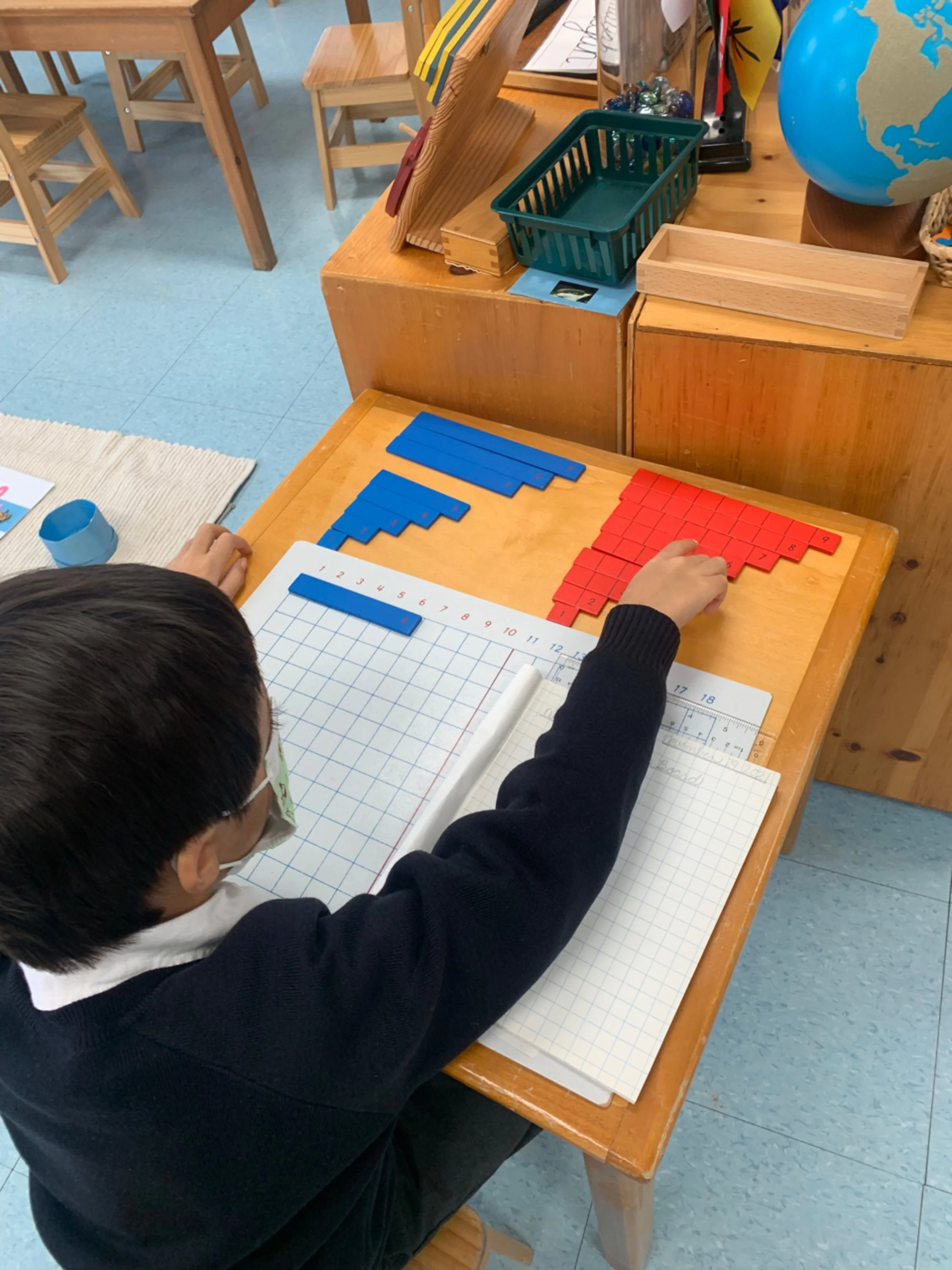Toddler (18 to 36 Months)
Our Montessori Toddler program is based specifically on the needs of children 18 months to 3 years of age. We provide a nurturing community for our young children that demonstrates respect for the whole child, and fosters a lifelong love of learning. Dr. Maria Montessori believed that young children are like a sponge, absorbing boundless amounts of knowledge from their environments rapidly and with ease. With a student-teacher ratio of 5:1, our Toddler teachers provide a well-prepared environment, each day, that meets the needs of the children within it. Our dedicated teachers carefully set out to prepare the environment in an effort to spark the child’s curiosity, entice discovery and exploration, and offer ample opportunities for each child to flourish at his/her own pace.
Children in the Toddler environment benefit from a consistent and simple daily schedule that provides security and comfort. Each day consists of a one to two-hour period of uninterrupted work, up to two hours of outdoor physical literacy, snack and lunch served “family style”, and a rest period. All meals are provided daily for the children.
Mealtime in our Toddler environment provides excellent learning opportunities for the children. While eating “family style”, the children explore their five senses, develop healthy eating habits, and continue to become independent. The children help to set the tables, serve the food, and clean up their environment when finished.
During the children’s period of work, they are introduced to materials that will develop their coordination, communication, independence, and concentration. Our Toddler environments are equipped with hands-on learning materials in the areas of Practical Life, Language, Developmental Aids, Arithmetic, Art, and Music and Movement.
Casa (3 to 6 Years)
The Tall Pines School Casa environment is a real home for our Casa children. Everything is arranged with their best interests in mind. The furniture is the right size, and children can freely and joyously develop themselves. The environments have child-sized chairs, tables and sinks, and the shelves are low and within easy reach. The focus is not just on the physical environment, but also on the emotional environment. Every child, with his/her unique personality, is respected as an important member of a community.
The Tall Pines School Montessori Casa program consists of twenty-six students from three to six years of age, guided by two trained Montessori teachers. Instead of grouping children according to age, Dr. Maria Montessori established a three-year age mix to allow for both individual and social development. This grouping of ages is not accidental. In fact, it is a purposeful implementation, and it is one based on scientific research. Our classrooms provide a unique cycle of learning designed to take advantage of the child’s sensitive years of development, when they can absorb information from an enriched environment. The open-ended curriculum allows each child to progress at his/her own pace in a dynamic, energized, free-flowing classroom with hands-on learning.
To begin each day, every child is greeted by a teacher with a handshake and a welcome. This ritual and personal contact offers the safe and caring transfer of the child from the parent to the teacher, ensuring each child feels welcomed and valued as a member of the classroom community.
Inside of our Montessori Casa classrooms, the carefully prepared environments allow the children to work independently or in small groups, and allow for the joy of self-discovery. Each of our Casa classrooms are carefully designed to encourage exploration, communication, independence, and the development of community. Our classrooms are equipped with a full set of Montessori materials and are divided into five distinct areas: Practical Life, Sensorial, Arithmetic, Language, and Culture. We also incorporate Art, Music, French, Library, and Gym throughout the week. A swimming program is provided for children at four years of age. The materials found in the classrooms are strategically designed to foster the development of specific skills, and to enable internalization of concepts in a practical, concrete way.
We strive, each day, for two to three-hour uninterrupted work cycles in the morning and in the afternoon. During this time, the classroom teachers introduce children to materials and then remain a quiet presence in the classroom. Children are free to choose from materials they have been shown, and when they have mastered the concept, they are introduced to new activities of increasing challenge. As the children grow and develop, the materials increase in complexity, as the children are continuously working towards discovery and mastery. Dr. Maria Montessori believed that the goal of the educational process should not be to fill the child with facts but, rather, to cultivate the child’s own natural desire to learn. The uninterrupted work cycle allows for the children to develop a deeper concentration, a satisfaction with the completion of work, the desire to learn through the materials, and to create excitement about their work.
Each day, the Montessori Casa children will participate in up to two hours of outdoor physical literacy. It is our goal that all children in our program develop fundamental movement skills confidently, competently, and creatively, across a wide range of health-related physical activities. We provide our children with both structured and unstructured forms of physical activity, daily. Our outdoor physical literacy program aims to develop gross motor skills, coordination, balance, self-esteem, teamwork, and sportsmanship. In addition, we are always looking for ways to use the outdoor environment for educational purposes, as the Montessori curriculum emphasizes contact with, and exploration of, the natural world.
Nutrition is an important aspect of the children’s day at Tall Pines School. A well-balanced meal provides nutrition for children to grow, develop, and learn. Tall Pines School will provide nutritious snacks for the children in the morning and afternoon. The children are involved with the set-up and preparation of these snacks, each day. For lunch, parents are to send in a healthy well-balanced meal for their children to enjoy. Lunchtime in our environments is a time to come together, to have polite conversation, and practice grace and courtesy. The children are involved in setting the tables and cleaning up their environments once the meal is complete.




